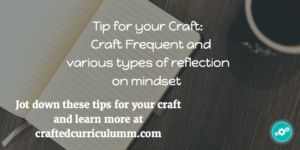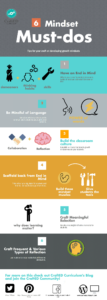Facilitating meaningful student reflection is possibly the most difficult mindset topic to tackle in the classroom. I’m yet to meet a teacher who would argue the significance of student reflection, but where we get stuck is how to craft meaningful reflective experiences for students.

Meaning is tied to relevance. So asking students to reflect on something, to which they don’t see the value, is going to be hard to get buy-in. Now this looks different for a Kinder student than a High School student. For adolescents, perhaps the focus of reflections is on self-to-social interactions and helping them see that there is power in intra-personal awareness, as it directly relates to interpersonal interactions. For younger students, questions may relate to how their mindset and behavior relates to feelings or fun. It is my observation that it is human nature to like thinking and talking about yourself and what you are passionate about, so find a way to ask mindset questions that will elicit these human-like responses. Here is an example: Reflect on a time when you faced a challenge in one of your favorite sports/hobbies. What made you keep going? What was the outcome-what did you learn? Compare/contrast this experience to something that happened during the past project we completed.” or “We have recently learned about introverts and extroverts. Which one are you? What makes your social style an asset and a challenge to group work? Provide a concrete example from group work time this past week”
Tip 6 : Craft Frequent and various types of reflection on mindset
Students need to be in the routine of reflecting on themselves as a learner often if it is going to become a habit, and eventually a demeanor they exude. For this reason, we don’t want to wait until the end of a project, unit or even a week to take time out to reflect on our thinking and actions. You can mix it up on a daily basis with these quick ideas for a reality/gut check on mindset, by simply asking a question related to your “end in mind” for your Super Agents:
- exit tickets
- entry tickets
- quick writes
- think, pair, share
- goal setting
- chalk talks
- graffiti walls
- intention setting
- journal entries
If you have a little more time you can also think about building out the social part of these reflections by having peers and experts offer a listening ear, consulting, or just simply dialogue. Check out my favorite protocol for this from NSRF here.
And for moments when students hit a bump in the road and need some additional reflection time, you may consider setting up an Agency Station for download time where students can reflect on how to get unstuck or use their own toolkit to move forward-for more on this check out CraftED Curriculum’s Foundational Strategies on reflection!
I would love to hear if you try any of the tips or resources offered up this month on our Mindset Must-dos Series. Be sure to share your stories and tips with the CraftED Community on Facebook, Twitter or Pinterest.

